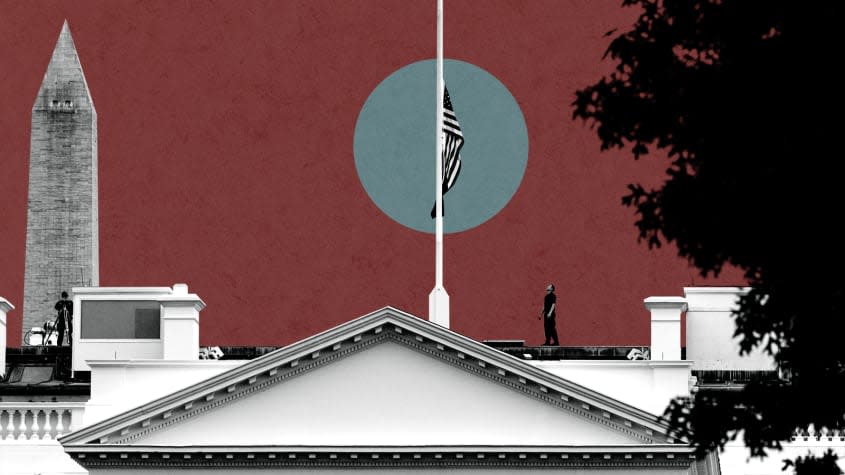6 modest proposals to prevent gun violence in America

The nation is reeling after a gunman on Tuesday opened fire inside a Texas elementary school classroom, killing at least 21 and injuring an unknown number of others. As traumatized children recover, families grieve, and authorities investigate the details of an attack that occurred just days after a racially-motivated shooter killed 10 inside a Buffalo supermarket, the all-important question looms: What can America do about gun violence?
Schumer could push gun control measures
Senate Majority Chuck Schumer (D-N.Y.) on Tuesday night took the procedural step of placing two gun control bills passed by the House in March 2021 — the Bipartisan Background Checks Act and the Enhanced Background Checks Act — on the Senate's legislative calendar. As is suggested by their names, both bills propose expanding and strengthening background checks for gun sales. Schumer's options are limited from there, notes Punchbowl News. Even if he moves to end debate on both bills, "there almost certainly won't be enough support to overcome a GOP filibuster" on either measure.
Congress could pass red flag laws
Meanwhile, the "lowest-common denominator" in the gun control debate seems to be "red flag" laws, which allow law enforcement to temporarily seize guns from individuals believed to be a threat to themselves or others, Punchbowl News says. Nineteen states have already implemented such measures.
A number of senators have now identified red flag legislation as a possible point of compromise, The Hill reports. "We talked about the red flag. It's worked," Sen. Joe Manchin (D-W.Va.) told the Hill on Wednesday, referencing conversations he's had with colleagues. "It's been very effective."
GOP Sen. Susan Collins of Maine also believes red flag legislation could work on a bipartisan level.
The Senate could end the filibuster
It's very unlikely, given opposition from senators Manchin and Kyrsten Sinema (D-Ariz.), but Democrats could also attempt to eliminate the filibuster to pass gun control legislation, political analyst Ronald Brownstein wrote for The Atlantic. In 2021, the Pew Research Center found that 81 percent of Americans supported background checks for gun purchases, 63 percent supported an assault weapons ban, and 64 percent supported a ban on high-capacity ammunition magazines. But "in their opposition to gun control, Republicans in Congress clearly are prioritizing the sentiments of gun owners in their party over any other perspective, even that of other Republican voters," Brownstein said.
Consequently, "if there is any hope for congressional action on gun control in the aftermath of the Uvalde tragedy … it almost certainly will require reform or elimination of the filibuster," he went on.
The Senate could pass domestic terrorism legislation
In the wake of the Buffalo shooting, the House passed the Domestic Terrorism Prevention Act of 2022, which would create offices inside the Department of Homeland Security, the Department of Justice, and the FBI dedicated to tracking and analyzing domestic terrorism threats. In the Senate, however, the legislation stands far less of a chance; Republicans are concerned the bill gives the government far too much leeway in monitoring political speech. The American Civil Liberties Union had argued against an earlier version of the measure in 2019, claiming federal agencies would use the framework to unfairly investigate people of color and marginalized communities, The Dispatch reports.
Congress could move on the Active Shooter Alert Act
A bipartisan group of lawmakers introduced a bill earlier this year that is intended to develop alert systems for active shooter emergencies. If passed, the bill would "create a role within the Justice Department to coordinate active shooter alert efforts nationwide," The Dispatch writes. The Active Shooter Alert Act has yet to pass either chamber of Congress.
Taking steps locally
The Center for American Progress on Wednesday suggested that if elected officials at the state or federal level aren't getting anything done, city and county officials in Texas could instead "take meaningful steps to prevent gun violence" on their own, without legislative action. In its recommendations, the CAP suggests community initiatives like improving gun violence data collection and reporting, addressing the problem with "racial equity and trauma-informed solutions," and partnering with schools and school boards to bring conversations surrounding gun violence prevention into classrooms.
You may also like
What happened in the Robb Elementary School shooting
Beto O'Rourke angrily confronts Texas Gov. Abbott during school shooting presser

